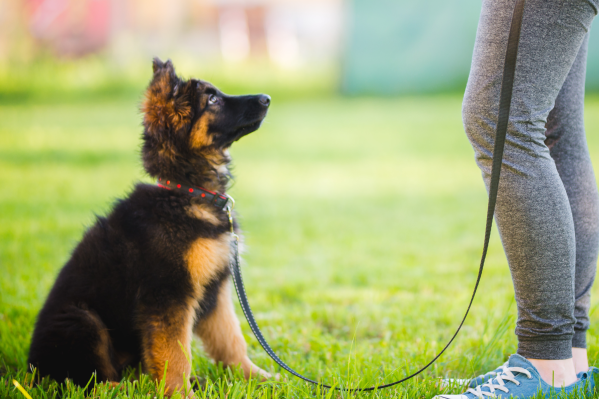If you’re a fan of large, obedient dog breeds, you’ve probably considered getting a German shepherd at least once in your life.
German shepherds are one of the most intelligent breeds out there, which is why you spot so many of them working alongside policemen, helping out TSA at the airport, and much more. Their high intelligence paired with their keen sense of smell make these pups excellent crime-fighting sidekicks, to say the least.
Hundreds of years ago, German shepherds were bred in Germany and originally used to herd sheep and protect them from potential predators. So whether they’re on the farm or working with your local police force, the main purpose of these pups hasn’t changed; they are bred to work due to their high intelligence and strength, and definitely get bored if they’re not around enough action.
However, that doesn’t mean that German shepherds don’t make great pets, whether you live on a farm or not. Just make sure you have a large backyard or frequent dog parks enough to keep this active breed satisfied.
German shepherds also require a high level of training, so you shouldn’t adopt or bring one home unless you’re willing to spend time reinforcing discipline for your new canine. They thrive off of rules and routine, so it’s best to start training as early as possible.
If you're wondering how to train a German shepherd and have no clue where to start, check out this easy guide.
How to train a German shepherd: 5 tips
1. Start early
Of course if you’re getting your German shepherd from a breeder, it’s important to find one that’s ethical and has a great reputation. Otherwise, your German shepherd could have unforeseen health issues or other ailments due to cross breeding or a lack of care from an early age.
Since German shepherds are bred to be protectors and guardians, socialization at a young age for them is crucial. Even a few weeks after birth, your German shepherd puppy will be able to follow simple cues and commands from you. Make sure to bring your puppy around lots of friends and family so they can get used to different people right away. This will set them up for success in their training.
You can start by playing short and simple games with your puppy. Whether you pick up some smart toys that will keep your puppy entertained or take them to different environments to play fetch, keeping them occupied and learning is key. This will help instill a sense of confidence in your dog, which will set them up for more success in the future.
Read: The Best Interactive Dog Toys
2. Stay consistent
It’s been said that German shepherds are one of the easiest breeds to house train and consistency is key when getting your pooch to do what you want. At three to nine months of age, you can teach your puppy commands like sit and stay. Your dog will be eager to learn and impress you.
3. Lead with kindness
This isn’t just a great mantra to adopt for your everyday life, it’s also a great way to work with your German shepherd. Since these breeds are eager to learn from you, there’s no need to scare them into doing what you want them to do. Treating your dog with kindness will help them keep up with their confidence throughout their lives, which will make them a stronger dog in every way possible.
Not training with kindness can lead to issues that can follow your dog for the rest of their life, like anxiety, stress, and acting out when they’re in unfamiliar environments.
4. Use positive reinforcement
Give your German shepherd extra love, treats, or a combination of both if they’re picking up quickly and learning commands like a pro, which they are likely to do.
Maybe even take a road trip with your pup where they can run free and stretch their legs as much as possible. Anything you can do to keep up the positive reinforcements will benefit your German shepherd for the rest of their life.
5. Continue impulse control, obedience, and more
Before the age of two or three, your German shepherd should be completely out of puppy mode and operating as an adult canine. That means the skills and tricks you have instilled during puppyhood should continue to be sharpened as the dog matures. At this time, you can teach your dog scent work and training if you so desire.
Make sure to keep your dog motivated by introducing new challenges, whether that comes in the form of new toys, new games, or anything you can think of. A healthy German shepherd is a stimulated one, so they’ll definitely challenge you to be as fun as creative as they are.
